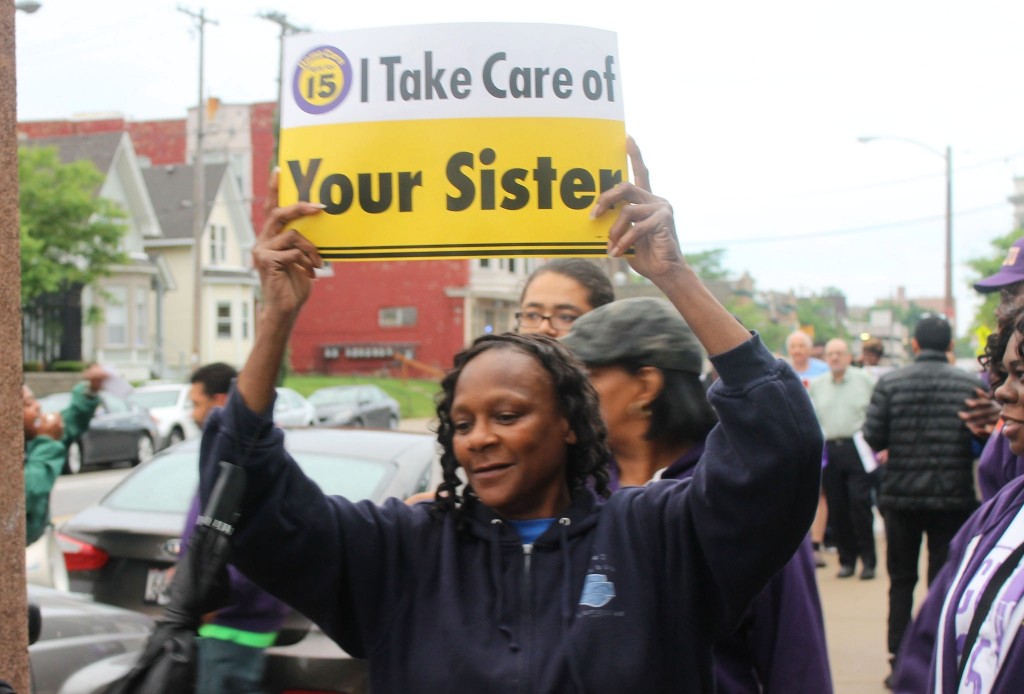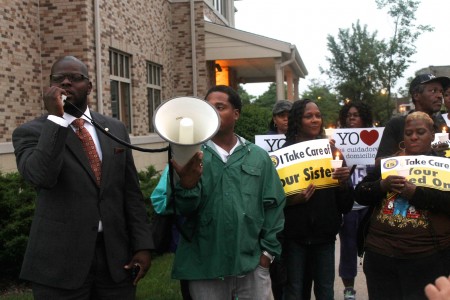Home Care Workers Demand $15 Hour Pay
Care-givers working in state-funded program serving people with disabilities negotiate for better pay and benefits.

Milwaukee home care workers marched in front of the MCFI building demanding higher benefits and increased wages. Photo by Madeline Kennedy.
Milwaukee home care workers gathered with community supporters and government leaders recently for a candlelight vigil they hoped would shed light on wage and benefit negotiations with the Milwaukee Center for Independence.
Vigil attendees were protesting MCFI’s New Health Services (NHS) program.
NHS is a taxpayer-funded home care program and is designed to provide older adults and people with disabilities the opportunity to continue living at home while receiving assistance from a caregiver. Through this program, nearly 1,200 caregivers provide services to more than 1,400 Milwaukee residents, according to MCFI.
About two dozen people participated in the event. For more than an hour, home care workers and their supporters marched in front of the MCFI building at 2020 W. Wells St. waving signs, chanting and encouraging passersby to stand with the home care workers.

County Supervisor Supreme Moore Omokunde speaks to the crowd about the role home care workers play in the city. Photo by Madeline Kennedy.
“We came out on this rainy evening to hold a light up to MCFI so everyone knows what they’re doing to these workers,” said African-American Roundtable Co-Chair Rosalynn Wolfe.
The caregivers make $11.66 an hour based on the Milwaukee County Living Wage Ordinance. With the help of their union, SEIU Healthcare Wisconsin, they are attempting to renegotiate their contracts with MCFI to receive paid time off and a $15 an hour wage.
Sylvia Moreno has been employed as an NHS home care worker for two years. “We work hard every day and deserve to be treated with the same dignity and respect we provide daily to our clients,” Moreno said at the vigil.
“Home care workers restore hope to people who are vulnerable and dignity to those who have fallen. It’s a difficult, taxing job and these folks deserve a decent wage for doing it,” Wolfe added.
Martha De La Rosa, chapter director of 9to5 Wisconsin, which is a union of working women, pointed out that home care workers often need to choose between earning a paycheck and spending time with their own families. Her mother was a home care worker for 25 years and her sister serves as a caregiver today.
“We need to take a long, hard look at how our home care workers are treated,” she said. “My sister works two jobs to take care of her seven children, so she’s not home to spend time with them. … No one has the right no force someone to choose between their work and their family. No one.”
County Supervisor Supreme Moore Omokunde, who spoke at the vigil, also talked about his experience watching family members, including an aunt and cousins, serve as home care workers.
According to MCFI Director of Communications Nan Bialek, NHS has been in negotiations with SEIU representatives since January and was aware of the picketing. Bialek declined to offer additional details on the issues being discussed, since the negotiations are ongoing.
The group gathered outside MCFI’s headquarters seemed confident that their demands would be met.
“God is on our side. There’s no question about that,” Rev. Joseph Ellwanger said in the vigil’s closing prayer. “Our candles represent the goodness that illuminates the darkness we feel in our lives. Things can get pretty dark at times, but there’s a light–the light of those working for justice. No darkness will put out that light.”
This story was originally published by Milwaukee Neighborhood News Service, where you can find other stories reporting on fifteen city neighborhoods in Milwaukee.





















My wife’s grandfather receives home care (in Illinois and I have no idea what they make an hour). I don’t think I could be paid enough to do what they do for him. That seems like an incredibly difficult job.
It is indeed daunting job, and one I don’t even know if I could do. I still have two concerns.
1. If wages are increased by almost a third, how does this affect budgets for these programs? Are we able to help less people because the costs have risen so drastically?
2. I’m uncomfortable with the programs that push to pay family members to take care of their own loved ones. I recognize the burden that loved ones feel to take care of their family members, but I struggle with the idea that in years past, family members already took care of their loved ones without being asked to get paid. This is a complicated topic, so I’m not 100% for or against, just concerned.
That being said… paying a CNA $15 an hour makes a lot more sense than paying a fast food worker $15/hr.
That’s a valid concern AG. Is there any oversight of family members taking care of loved ones if they are paid to do so? Do you have to receive at least a minimum amount of training before they can provide care? I can imagine a whole lot of people suddenly in a rush to take care of a family member if payment is involved.
PMD- you’re on the right track. There rarely is additional training unless you’re going to be providing personal cares. Most of these workers are providing supportive home care (think housekeeping) and being a paid caregiver is about the only thing that keeps people off of the unemployment line.
The support tool is suppose to factor in “natural” supports but many times once a family member sees the dollar amount they will then bill for all hours possible. Much of the time is also providing inactive support which is really hanging out to make sure nothing harmful happens.
There are many many caregivers that deserve more but there are plenty were I’d feel that their current wage is appropriate. The problem is that the union in thsi case lays down a blanket wage were all are paid the same.
AG- many people receive state funding either through IRIS or Family Care where they receive an allocation. If its more expensive to provide supports either the state would have to increase the allocation or adjust the amount of paid support vs natural support.
I am a nurse that worked in Family Care. A RN assesses and monitor’s a “consumers” care by their family ever 6 months if stable and more frequently if there are medial needs or questions of the care being managed. Many disabled elderly are in day care programs during the day. I used to communicate with the day care people, nurses and caregivers how the person was doing, either with a face to face view or phone call.
If my “consumer” was admitted to the hospital, I would assess their needs on return to the community, assessing where they needed to go and looking for an option, working with the family. Generally, people gave good care to family members. In the hospital we would teach family member cares such as a central line catheter, care of oxygen, ect, because there were in the home 24×7. That is if the family has the capacity to learn. Many family member’s care for elderly, disabled and get paid something for it. Each client/ consumer also had a cm that took care of non medical issues. Initially, people were given way too much pay for care, FC sent nurses in to re-evaluate and assess the client/consumer’s needs based on criteria. Initially, paid care was in excess of what was warranted. That caused a lot of problems, it is hard to cut off care amounts once it is given. I do think going to a telephonic system through a for profit insurance company is not appropriate for these populations. Other things need to be looked at like abuse, financial abuse, people in group homes need to be monitored, found neglect in group homes. Pulled people out of group homes due to poor care. Also found some fraud, but not much.